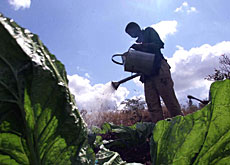
Swiss head for Earth Summit with high hopes

The Swiss delegation heading to Johannesburg for the world's second Earth Summit is upbeat about the outcome of the conference.
The Swiss foreign minister, Joseph Deiss, insists an agreement can be reached on a global action plan to combat poverty and guarantee the Earth’s natural resources.
“I am optimistic because the last few weeks have shown that everybody is very keen to find solutions,” Deiss told swissinfo.
Deiss says his task as leader of the Swiss delegation will be to focus on trying to reach consensus on a concrete inter-governmental agreement.
“Switzerland will go straight for the most important issues and leave behind more minor questions,” he said.
“We will try to be concrete, which means aiming for results which will lead to activities which can be monitored,” he said.
Swiss themes
The main themes of the summit are water and sanitation, food security, energy, health and biodiversity. But Switzerland has chosen to focus its preparatory efforts on issues ranging from mountain development to trade, water, the environment and good governance.
To get these messages across they will be hosting a daily programme of workshops and seminars at a dedicated Swiss information platform dubbed “Sustainable Switzerland” in Ubuntu Village – the main exhibition site in Johannesburg.
Walter Fust, deputy head of the Swiss delegation and director of the Swiss Agency for Development and Cooperation, says management of the world’s finite water supply must be one of the key priorities for high-level discussion at the summit.
Top of the agenda
“Water is going to be a key dimension of world politics in the future,” Fust said.
“Certainly Switzerland is fortunate with regard to its water resources, but we are not just going to tell the world how fortunate we are.”
Fust – whose agency spends millions of francs every year on development aid designed to improve accessibility to water in countries where drought is common – says Switzerland should use the summit to offer its expertise to nations seeking to better manage access to water.
Also high on the Swiss list of priority topics at the summit is the issue of food security in southern Africa.
Guest speakers at the Swiss pavilion are due to discuss the current famine crisis as well as focus on what the international community can do to help.
United Nations estimates suggest that at least 13 million people in southern Africa risk starvation, while millions more are suffering from the effects of malnutrition in Afghanistan, North Korea, and in the Israeli-occupied West Bank and Gaza Strip.
Questioning domestic policy
Swiss non-governmental organisations have broadly welcomed Switzerland’s eagerness to promote policies of sustainable development at the summit, but criticise the country’s leaders for failing to ensure such initiatives reach the national political agenda.
“The Swiss delegation could play an important role because it is very proactive and seems to be looking forward, looking for consensus with other countries,” said Heini Glauser, president of Greenpeace Switzerland.
“But in the end they have to accept that the official political stance in Switzerland is more in favour of global trade and less with environmental and social questions,” he told swissinfo.
Peter Niggli, executive director of the Swiss Coalition of Development Organisations, says Switzerland has failed to implement policies of sustainable development over the past decade.
“There is no political will… and we can’t say that Switzerland is on a path of sustainable development,” said Niggli.
“Even though Switzerland has put forward quite a progressive international policy on these issues, on the home front our government has shied away from taking any political lead on this issue.”
Swiss NGOs point out that Switzerland is keen to promote the protection of mountainous regions around the world, but has so far failed to ratify the protocols of a 1991 Alpine Convention signed with France, Italy and Austria.
Accepting criticism
Answering the criticism levelled by NGOs, Fust admits that Switzerland has failed to turn worthy intention into political action at home.
“Certainly a lot still needs to be done,” he said. “And what I think we did not do well was translate Agenda 21 [the global action plan signed at the Rio Earth Summit in 1992] into the political agenda on a national level.”
Philippe Roch, director of the Swiss Environment Agency and a senior member of the Swiss delegation, agrees that the government needs to seize the initiative but adds that much has already been achieved.
“It’s clear that we still have progress to make, but in Switzerland we have, for example, already implemented measures to protect our mountains and forests,” he said.
After Johannesburg
Fust argues that the true test of whether the 2002 Earth Summit has succeeded or failed to deliver – on both a domestic and international level – will only come in the months and years after the heads of state have returned home and begun to put turn words into action.
“I am hopeful that this summit might open the eyes of a number of our politicians to think how Switzerland can put its own house in order,” Fust comments.
“Switzerland needs to reconfirm its willingness to move on and to ensure that [in the future] trade, social development and the environment go hand in hand.”
by Ramsey Zarifeh
The World Summit on Sustainable Development opens on August 26 and runs until September 4.
Switzerland has chosen mountain development, water, social development, trade, the environment and good governance as its main themes for the summit.
The heads of each national delegation have been allotted five minutes to address the summit’s plenary session.

In compliance with the JTI standards
More: SWI swissinfo.ch certified by the Journalism Trust Initiative

























You can find an overview of ongoing debates with our journalists here . Please join us!
If you want to start a conversation about a topic raised in this article or want to report factual errors, email us at english@swissinfo.ch.